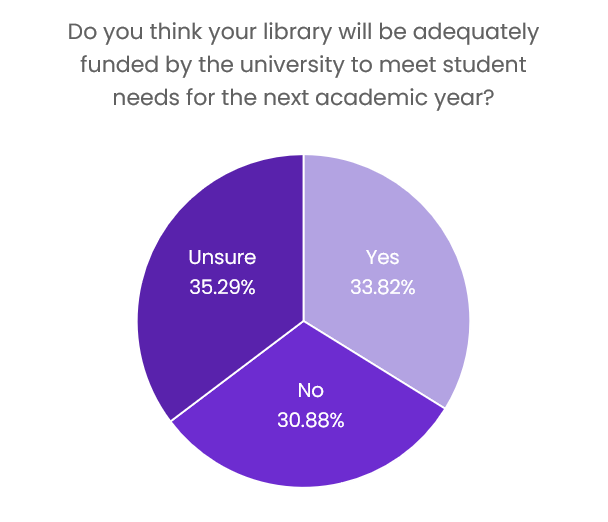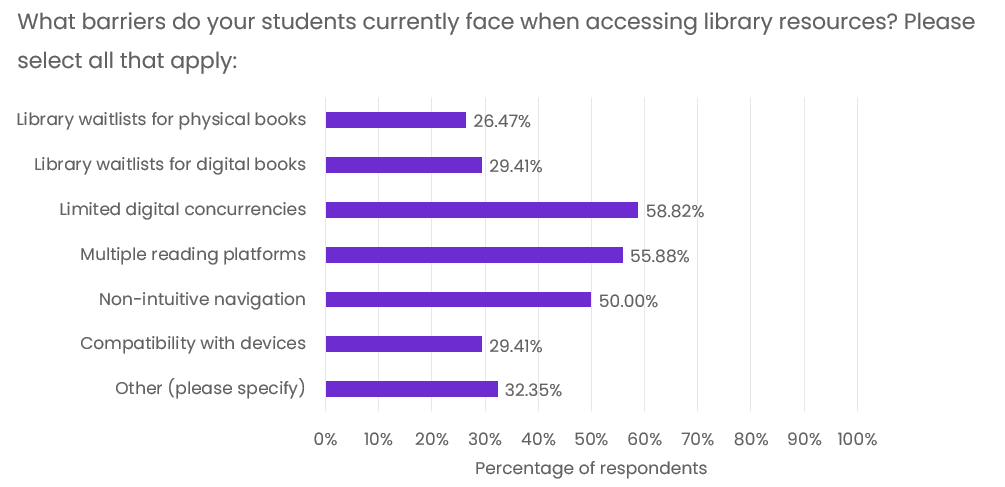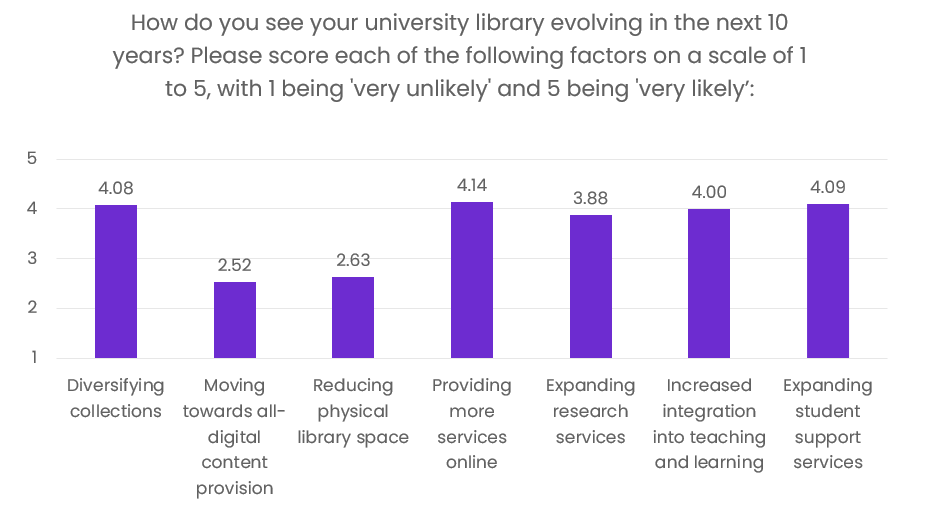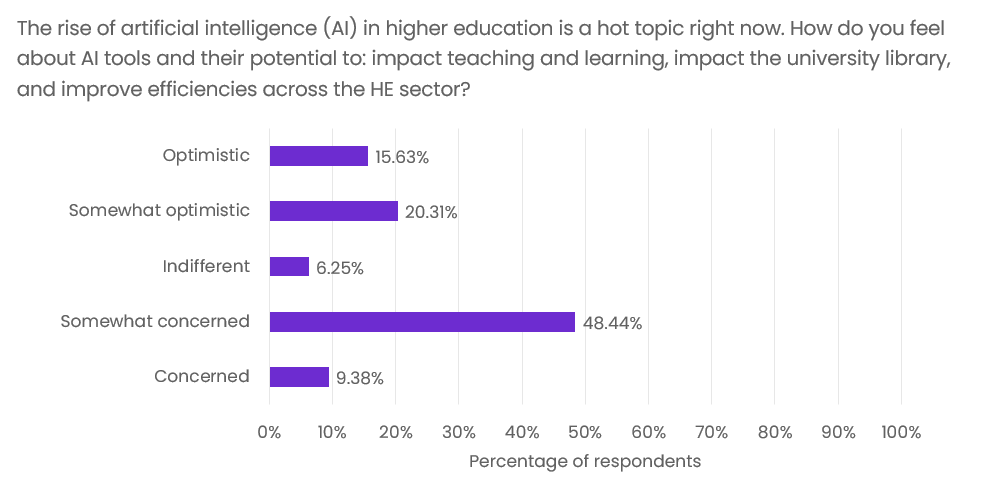Kortext Annual Librarian Survey 2023 – the results!
We received a fantastic response to this year’s survey. 68 library staff took part, with roles including Director of Student and Library Services, Acquisitions and Reading List Coordinator, and Faculty Librarian. Over a third of respondents (35.29%) weren’t existing Kortext customers.
Our survey this year was in two parts. Section 1 asked about the last 12 months and the university library today, with questions on funding and digital content. Section 2 looked at the future of the university library, including the projected increase in student numbers and the impact of AI tools.
The results reveal concerns about funding, the increasing importance of digital resources, and ambivalence about the role of AI. Overall, respondents were clearly optimistic about the future of academic libraries in the next decade.
Uncertainty about funding
Only a third of respondents (33.82%) thought their library would be adequately funded to meet student needs in the next academic year.
This indicates that librarians will be seeking the best value for money with content provision to address the challenge of providing sufficient resources amid budgetary constraints.

Given this, it’s not surprising that the majority of respondents (64.71%) said the importance of Open Access (OA) and Open Educational Resources (OERs) had increased at their institution in the last 12 months.
This is a cost-effective method of resource provision, but respondents also flagged uncertainty about transitional agreements as a potential barrier.
“I’d like to see the transitional agreements become fully OA with affordable options. More OA book publishing would be beneficial to students, but there needs to be a sustainable model.”
Over two thirds of respondents (67.65%) found data analytics valuable. This makes sense if librarians are needing to stretch their budgets further, working even smarter and making more informed decisions about acquisitions and content usage.
Growth of digital spend
The majority of respondents (61.76%) said their digital content spend had increased in the last 12 months.
However, the extent of eBook access varied significantly. We asked respondents what percentage of books at their institution were accessed digitally compared with print. The responses ranged from <1.5% to 100%, with a median figure of 60%.
There continue to be pain points for librarians with eBooks around affordability, licence restrictions and the complexity of providers’ access models.
“Reasonable cost per eBook, comparable with print books….I’d like to see all academic textbooks available with unlimited licences, or at the very least multiple user licences…”
In terms of the barriers students face when accessing library resources, respondents identified limited digital concurrencies, multiple reading platforms, and non-intuitive navigation as the key issues.

In ‘Other’, respondents identified technical problems with third-party platforms (broken links, pop-ups and failure to load content), suppliers’ diverse authentication requirements, and digital poverty (access to devices and/or a stable, fast internet connection) as additional barriers for students.
The changing library
UCAS’ Journey to a Million projects there could be up to a million higher education applicants in a single year by 2030, an increase of a third on today’s figures.
Given this, we asked respondents whether a larger student body and the likelihood of more flexible course delivery would result in their library increasing its digital content catalogue. The answer was a resounding ‘yes’ from 93.75% of respondents.
Despite this predicted increase in digital content provision, over two thirds of respondents (67.19%) said they weren’t worried about the future of the library as a physical entity. In fact, the majority (81.82%) thought library buildings would still exist in 10 years’ time, but offering a wider range of services.
“Library staff need to use this opportunity to increase and enhance their physical presence within library buildings and explore new ways of offering services and support to students, delivered collaboratively with other institutional student support services….I think the future of academic libraries is exciting and will benefit students immensely.”
On this note, we asked respondents in more detail about how they saw their library evolving in the next decade. The data in the graph below shows a weighted average of the responses.

Our respondents thought it was unlikely that their library would move to all-digital content provision, but likely that more services would be provided online.
Picking up again on services that libraries might offer in the future, respondents said it was likely they’d evolve to include more student support services, become increasingly integrated into teaching and learning, expand research services and diversify their collections.
However, some respondents were concerned about their library becoming a one-stop shop for students, when they’re already grappling with funding constraints and pressures on existing staff.
“…the library, being often the only place open and easily accessible, ends up providing counselling, disability support, and language support, none of which we’re trained to do.”
The impact of AI tools
We couldn’t do our survey this year without raising the topic of the moment – AI. We asked our respondents how they felt about AI tools and their potential impact on higher education.
Given that so much is yet unknown, the majority of respondents (57.82%) were understandably either ‘concerned’ or ‘somewhat concerned’ about the effect of AI tools on the sector.

Many respondents were apprehensive about academic integrity and plagiarism if students use generative AI tools to write assignments. Also, there were concerns about AI leading to job losses in libraries.
“We don’t really know what will happen but there is a fear that AI will put a lot of people out of work and that educational achievement will be watered down.”
However, we received lots of positive comments about the potential impact of AI tools too. Some respondents thought AI could be a powerful research tool, while others said it could assist libraries with streamlining workflows, content creation and content delivery.
“There is scope to automate processes and focus human support on more high-level tasks.”
Finally
Just for fun, we asked respondents if there was one book they would recommend to their students. The most popular response by a long way was Stella Cottrell, The Study Skills Handbook.
Thanks to all our respondents for taking the time to share your views. We really appreciate your feedback.






